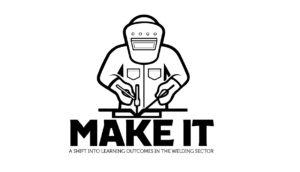 MAKE IT
MAKE IT
A shift into Learning Outcomes in the welding sector
Erasmus+ Sector Skills Alliance (2015-2018) BE, ES, HU, NO, PT
European Welding Federation (www.ewf.be ) (2015-3299 / 562642-EPP-1-2015-1-BE-EPPKA2-SSA)
Training and Qualification of Welding Personnel has been developed over the years by National, European and International bodies and their accredited training centres. But there is an urgent need for modernizing and developing an innovative approach and methodology, regarding the qualification and training process in the welding sector – a shift to the Learning Outcomes (LOs) approach, a correspondence to the European Qualifications Framework (EQF) levels and a possible assignment of European Credit system for Vocational Education and Training (ECVET) points.
The MAKE IT project will allow the redefinition of the “European Welding Practitioner” professional profile, addressing the market need for qualified people in welding technology and with competences not only in the “old” processes but also in the “new”, advanced ones. Europe is changing increasingly quicker, so learners and professionals need an adequate training curricula and a structured system for validation of competences. MAKE IT will promote the cooperation between different EU and national recognition tools, by ensuring that skills and qualifications can be easily recognized across borders.
The main aim of the project is to develop a European sector-oriented qualification system into the LOs approach and establish a European harmonized scheme for Recognition of Prior Learning (RPL) in the Welding sector. This will facilitate recognition and certification of the respective LOs by:
- – Implementing the European Credit system for Vocational Education and Training (ECVET) principles
- – Integrating innovative approaches to teaching and learning;
- – Improving the European Quality Assurance in Vocational Education and Training (EQAVET) on the welding sector.

This project has been funded with support from the European Commission. This publication reflects the views only of the author, and the Commission cannot be held responsible for any use which may be made of the information contained therein.
